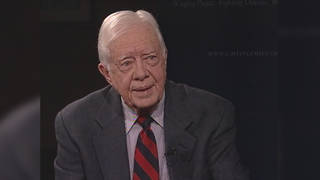Hi there,
With authoritarianism sharply on the rise and so much at risk—including our most basic rights—we're counting on our audience like never before to support our work and help us hold governments and corporations to account. Right now, less than 1% of people who count on Democracy Now!'s news, donate to support our work. If even 1% of our global audience made a donation of any amount today, it would cover our costs for 2025.Thanks to a group of generous donors, all donations made today will be TRIPLED, which means your $15 gift is worth $45. With your contribution, we can continue to go to where the silence is, to bring you the voices of the silenced majority. Every dollar makes a difference. Thank you so much.
Happy News Year!
Democracy Now!
Amy Goodman
Hi there,
With authoritarianism sharply on the rise and so much at risk—including our most basic rights—we're counting on our audience like never before to support our work and help us hold governments and corporations to account. Right now, less than 1% of people who count on Democracy Now!'s news, donate to support our work. If even 1% of our global audience made a donation of any amount today, it would cover our costs for 2025.Thanks to a group of generous donors, all donations made today will be TRIPLED, which means your $15 gift is worth $45. With your contribution, we can continue to go to where the silence is, to bring you the voices of the silenced majority. Every dollar makes a difference. Thank you so much.
Happy News Year!
Democracy Now!
Amy Goodman
Non-commercial news needs your support.
We rely on contributions from you, our viewers and listeners to do our work. If you visit us daily or weekly or even just once a month, now is a great time to make your monthly contribution.
Please do your part today.
HeadlinesDecember 14, 2009
African Delegates Protest Over Kyoto Dispute
The dispute between rich and poor nations at the Copenhagen summit is widening after a weekend of historic protest. Earlier today, the main negotiation session was temporarily suspended after African delegates led a protest over a dispute on the fate of the Kyoto protocol. The African bloc has accused richer nations of trying to abandon Kyoto by merging it with a separate negotiating track on a new agreement. Last week the chair of the Group of 77 bloc of developing nations, Lumumba Stanislaus Di-Aping, said U.S. proposals to cap global temperature increases at two degrees Celsius — 3.6 degrees Farenheit — would condemn Africa to a new holocaust. Referring to the head U.S. climate negotiator, Di-Aping said: “Is Todd Stern saying that destroying Africa…is acceptable to him? Is he telling us that the world will put Africa into a furnace? He is basically condemning Africa to death.” Developing nations want temperature increases capped at a maximum 1.5 degrees Celsius, which is 2.7 degrees Farenheit.
Organizers: 100,000 for Climate Justice March
As the summit moves into high-level talks, climate justice advocates are raising their voices in the streets. On Saturday, tens of thousands of people braved near freezing temperatures for a march through Copenhagen to just outside the Bella Center where the summit is taking place. Representatives from various indigenous groups led the march under banners reading “System Change, Not Climate Change.” Organizers say over 100,000 people took part. The march ended with a candlelight vigil led by the South African Archbishop Desmond Tutu.
South African Archbishop Desmond Tutu: “Well, here we are today marching and demonstrating, and the injustice of climate change will end, because climate change, the effects of it, are being felt most nearly by those who did not cause it — the poor, the vulnerable — and you are saying 'No!' to injustice. No! No!”
Over 1,200 Arrested in Weekend Protests
As the protest drew to a close, nearly 1,000 people were arrested when police cordoned off the tail end of the march. Charges were filed against thirteen protesters. Amnesty International Denmark has called for an inquiry into the arrests, saying all but a handful of people were unfairly targeted. On Sunday, over 200 people were arrested on a second day of protests.
Tuvalu: US Senate Will Decide Fate of Island Nations
As the Copenhagen summit begins its second week, the fate of climate legislation in the US Senate looms heavily over the talks. On Saturday, Tuvalu delegate Ian Fry said Senate actions will determine whether endangered island nations survive.
Ian Fry: “It appears that we are waiting for some senators in the US Congress to conclude before we can consider this issue properly. It is an irony of the modern world that the fate of the world is being determined by some senators in the US Congress.”
Senators Weaken Main Climate Bill
Fry’s plea came after architects of the main Senate climate and energy bills unveiled new, weaker proposals aimed at attracting Republican support. Democratic Senator John Kerry, Independent Senator Joe Lieberman and Republican Senator Lindsey Graham released a new “framework” for the Senate climate bill. Their proposal would reduce US emissions cuts to 17 percent of 2005 levels, down from 20 percent in Kerry’s initial bill with Democratic Senator Barbara Boxer. The 17 percent cut amounts to just a four percent reduction when adopting the 1990 levels used by the rest of the world. The new Senate “framework” also includes major financial incentives for nuclear power plants and expanded opportunities for offshore drilling.
“Cap and Dividend” Climate Measure Unveiled
Meanwhile, Democratic Senator Maria Cantwell and Republican Senator Susan Collins have unveiled another new climate bill that would scrap the “cap and trade” system included in the Kerry-Boxer and House measures. The Carbon Limits and Energy for America’s Renewal Act, or CLEAR, instead backs a “cap and dividend” approach in which polluters would have to pay for the right to pollute in addition to purchasing carbon credits. The proceeds would then be handed out as dividends to US taxpayers. While some environmentalists welcomed the bill as an improvement over cap-and-trade, the Union of Concerned Scientists said the bill “is too weak to meet its purported goals.”
House OKs Overhaul of Financial Regulation
In other news from Washington, the House has passed the largest overhaul of financial regulation since the Great Depression. On Friday, Congress members approved a sweeping package that would create a Consumer Financial Protection Agency, increase oversight over derivatives and hedge funds, and establish a mechanism to dismantle large failed companies. No Republicans voted with the Democratic majority. The bill’s chief sponsor, Democratic Congress member Barney Frank, criticized Republican opposition.
Rep. Barney Frank: “The American people, we’re told, have said no more expansion of government — not in the area, certainly, of financial regulation. Their view that the American people want no more restraints on Wall Street is wrong.”
The measure was approved after Democrats with close financial industry ties weakened several provisions. The final bill includes safeguards ensuring federal laws can override state banking regulations, which are often more robust. The Senate is expected to take up its version of the bill next year.
Lieberman Opposes Expanding Medicare Eligibility
The Senate healthcare bill is in limbo following a new reversal from Independent Senator Joseph Lieberman. Last week, Democratic leaders brokered a deal that would hand the pubic option over to insurance companies while expanding eligibility for Medicare. But on Sunday, Lieberman said he would oppose the measure unless Democrats exclude both the Medicare provision and any form of government-backed insurance plan.
Blair: Iraq Invasion Justified Even Without WMDs
Former British Prime Minister Tony Blair has ignited a new controversy around his role in the invasion of Iraq. In an interview with the BBC, Blair admitted he would have joined the US-led attack on Iraq irrespective of his purported beliefs on Iraq’s non-existent weapons of mass destruction.
Tony Blair: “I would still have thought it right to remove him. I mean, obviously you would have had to use and deploy different arguments about the nature of the threat, but I find it quite hard, because I spend so much time out there now, and, you know, they’re about to have an election which will be probably the single most significant thing that’s happened in that region for many years, because they’ve managed at long last to break out of actually the religious divide.”
Blair is scheduled to appear before a government commission investigating the Iraq war next month. Much of Blair’s testimony will remain sealed.
Iraq Signs Oil Deals with 10 Foreign Companies
Blair’s comments come just as Iraq has signed a series of major oil deals. A two-day auction ended Saturday with ten foreign companies winning access to Iraq’s massive reserves. The oil giant Royal Dutch Shell won the rights to the Manjoon oilfield near Basra, one of the world’s largest. The US-based Exxon Mobil and Occidental Petroleum also submitted winning bids.
Report: CIA Canceled Blackwater Drone Contract
The Associated Press is reporting the private military firm Blackwater has lost its CIA contract to load missiles on Predator drones in Pakistan. CIA Director Leon Panetta is said to have canceled the contract earlier this year.
Judge Blocks ACORN De-Funding
A federal judge has blocked the congressional effort to de-fund the anti-poverty group ACORN. On Friday, Judge Nina Gershon sided with ACORN’s argument that a measure stripping its federal funding amounted to an unconstitutional “bill of attainder.” The congressional vote followed the release of videos appearing to show ACORN offering advice to two right-wing activists posing as a pimp and prostitute. ACORN has long been a target of right-wing scorn for its work helping poor people with voter registration, tax problems and foreclosures.
Houston Becomes Largest US City to Elect Openly Gay Mayor
Voters in Houston have made history by becoming the largest US city to elect an openly gay mayor. City controller Annise Parker was elected Saturday with a more than 11,000-vote margin over opponent Gene Locke. Parker’s candidacy had come under fierce opposition from homophobic groups. A mailer sent out to Houston voters denounced Parker for “homosexual behaviour” and her backing from the “gay and lesbian political caucus.” Campaign records show two key members of Locke’s financial committee each donated $20,000 to the group behind the mailer. Parker will replace outgoing Houston Mayor Bill White, who is seeking the Democratic nomination for Texas governor.
Cuba Arrests US Contractor
In Cuba, a US contractor has been arrested on apparent charges of unlawful contact with Cuban opposition groups. The contractor’s company, Development Alternatives, is working under a State Department contract for so-called “democracy enhancement” in Cuba. The New York Times reports the contractor had traveled to Cuba on a tourist’s visa but then handed out cell phones and laptops to Cuban opposition groups.
Schwarzenegger: Property-Damaging Education Protest a “Type of Terrorism”
And in California, scores of people have been arrested over the last several days in protests against education cuts and rising tuition fees. Twenty-three people were detained Thursday after barricading themselves inside a building at San Francisco State University. On Saturday, sixty-six people were arrested after police broke up a four-day occupation of a building at the University of California, Berkeley. Later in the day, eight people were arrested after property was damaged at the home of UC Berkeley Chancellor Robert Birgeneau. Police say protesters broke lights, planters and at least two windows. No injuries were reported. In a statement, California Governor Arnold Schwarzenegger denounced the property damage as an act of “terrorism.” Schwarzenegger said, “California will not tolerate any type of terrorism against any leaders, including educators.”
Most popular
- 1
- 2
- 3
- 4
Non-commercial news needs your support
Please do your part today.












Media Options